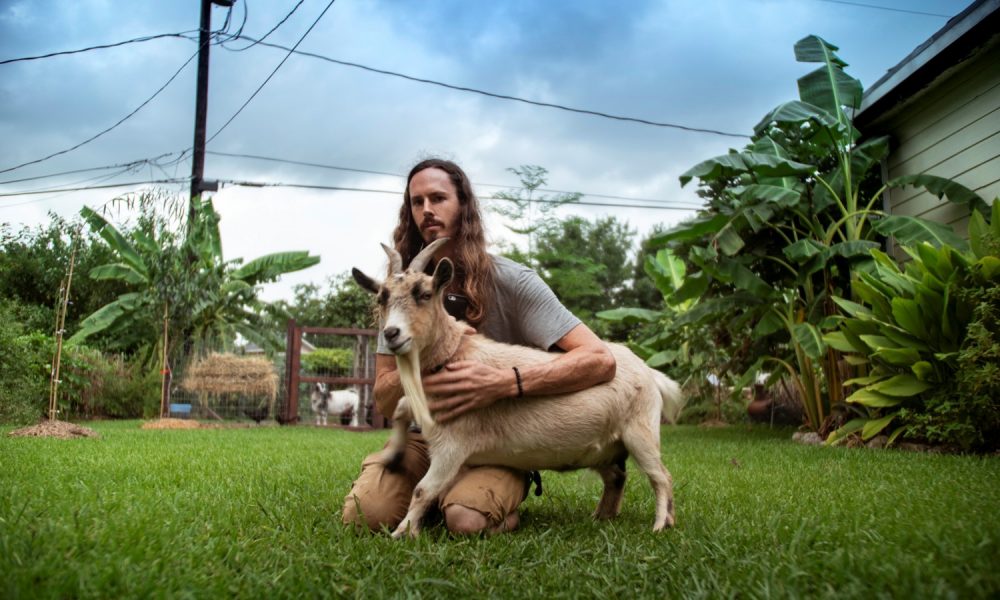

Today we’d like to introduce you to David Lippold.
David, let’s start with your story. We’d love to hear how you got started and how the journey has been so far.
I started El Jardin Perdido as a hobby. Perhaps I can still be considered a hobbyist, as I’m continually learning and growing. I think that’s the key to being successful in what you do; is to maintain be curiosity and passion towards your goals or career. I started off by planting a few small things. I specifically remember jalapenos being the first plant. I thought to myself, “Ok cool, maybe I can plant cilantro and tomatoes to make pico de gallo.” As I went down the rabbit hole, I slowly started experimenting and planting more edibles, fruit trees, and I would eventually start incorporating livestock like chickens and quail. I started in a tiny lot about six years ago. I had maybe a few hundred square feet of space to work with. I considered this my learning curve phase; finding out what worked and what didn’t. Almost three years ago, I bought a house in East End with a considerably larger amount of space (but still relatively small for growing my own food). I would take the knowledge previously learned from my first location build upon it here. El Jardin Perdido is essentially a project striving towards self-sufficiency in an urban environment. This is by no means a full-time job, and that’s the point. I’m creating a model so that almost anyone with a few free hours a week can mimic what I’m doing and produce their own food. My property is less than ⅓ of an acre, and that’s including my house. I’m not 100% ‘off the grid,’ but I do plan on producing a majority of my family’s organic food. As I learn from my own experience, I am sharing my acquired skill set with as many people as I can (via Youtube and social media) to get a movement rolling. So far I am able to supply my family with 100% of our own raw milk and yogurt (from our 2 goats), 100% of our egg consumption (from our chickens), and a great deal of our fruits and vegetables based on the season.
Although it was hard to start from scratch again, I would scale up with much more personal knowledge of growing food and raising animals. I basically started from the ground up. I cleared out the overgrown yard and started with a clean slate. There were a few existing fruit trees on the property which gave me a nice head start. Also, I’d notice some of the ‘weeds’ that popped up were edible. This is where El Jardin Perdido got its name. Translated, it basically means, ‘the forgotten garden.’ I paid homage to my location by giving it a Spanish name, due to the highly predominantly Hispanic demographic/history in my new neighborhood; which I found quite charming.
There came a point in which it was less about ‘planting things for fun,’ and more about moving towards a movement. My goal transformed into finding a practical approach to growing/producing as much of my own food as possible in an urban environment. I have a 6 & 7-year-old, and I want them to learn as much as they can about growing their own food; not only for quality and nutrition but also for security in an unpredictable future economy and increasing threat of climate change.
Has it been a smooth road?
Haha. Not exactly. You learn a lot along the way. Youtube, articles, and blogs have been a huge lifesaver; although you can’t trust everything you read on the internet (I’ve learned that the hard way). For this reason, I started my own youtube channel, ‘El Jardin Perdido’ not only give back but also build some momentum on this movement. I honestly think if everyone was doing what I’m doing, a lot of our society’s problems would be greatly minimized. Growing your own food (organically) means cheap access to healthy, highly nutrient-dense food. You’re cutting out the middleman and big businesses that are notorious for tainting food for their own profit. This also gives people more opportunity to produce and buy locally; or even just socialize and barter with one another.
Fortunately for me, my biggest investments were fruit trees. I’ve taken a some-what frugal approach to gardening and farming, so I haven’t had any huge hits. This includes growing a lot of things from seed, learning how to germinate and graft, making plant beds and animal structures myself with salvaged materials and breeding my own animals. The goats were a decent investment last year, but I really wanted to push what I was doing a little further and start producing my own raw milk. Their enclosure was the main investment, but just like I’m growing organically, -I want my animals to be in clean, healthy, and live in happy conditions.
Harvey was probably one of my biggest hits. A few of my fruit trees drowned from the flooding. What did I do? I made sure to plant all my future trees slightly elevated to avoid future catastrophes. All in all, I would say time has been my main investment. I’m raising two kids myself, working full time and freelance, and yeah, I’m an urban farmer too. Most of the work I’ve put into this has been on weekends with less than an hour a day devoted to chores in the AM and PM. The investment of time is more long-term.
We’d love to hear more about your business.
Right now, El Jardin Perdido is in its infancy. This had started as a concept and is just starting to gain momentum. I’ve started a YouTube this past year with more than 60 videos. These are mainly tutorials to help guide anyone interested in joining me in this movement. So yes, as of now I am investing lots of time and effort with zero return; which is completely fine by me. Eventually, I would like to gain more traction and start a local nonprofit and offer hands-on tutorials for others looking to learn how to live a more self-sustaining lifestyle in an urban environment. This concept has huge potential. I’m inspired by documentaries I’ve seen that used similar approaches to transform run-down urban settings into lush urban gardens.
This brings communities closer and gives people access healthy food in neighborhoods that would otherwise have zero accessibility. There are neighborhoods right here in Houston where most don’t have access to transportation and are usually on foot. The best they can do is obtain food from convenience stores or gas stations, all of which have a very limited selection (if any) of food. Most of this is junk food or canned food at best. I personally work in an area similar to what I am describing. I’m a very health-conscious person (a big reason why I started all of this), so fast food is not an option for me. There’s a fiesta nearby, but even this specific grocery store has very poor produce due to the area that it’s in.
Is our city a good place to do what you do?
I feel like Houston is a city with a great deal of opportunity. I’m from New Jersey and Philadelphia, where there is much saturation in almost any market. Houston is a city where you can stand out and do your own thing. One observation I’ve seen down here is the lack of motivation to do so by individuals; but the ones that do, usually get the most out of what they’re striving for. Houston seems to be very open to new ideas and entrepreneurs in general. I think it’s a great location to start something new!
Contact Info:
- Website: https://www.youtube.com/c/davidlippold
- Email: dmlippold@gmail.com
- Instagram: http://instagram.com/el_jardin_perdido
- Facebook: https://www.facebook.com/david.m.lippold
- Twitter: https://twitter.com/ho0dlulvl
- Other: www.davidmichaellippold.com








Suggest a story: VoyageHouston is built on recommendations from the community; it’s how we uncover hidden gems, so if you or someone you know deserves recognition please let us know here.

















